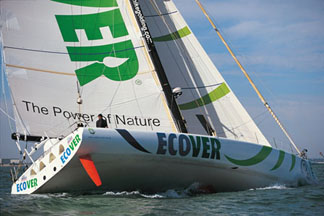On an industrial estate ten miles outside Antwerp, the Ecover detergent factory sticks out like a sore thumb. The other buildings are nondescript sheds with gray or beige metal roofs. Ecover’s factory is topped with a bright green lawn.
It’s not the immaculate sward beloved of suburban gardeners, more of a meadow, really. But it blends in with the surrounding fields and it is a key feature of what is still, ten years after it was built, the world’s most environmentally-friendly factory.
Its products – household cleaners and detergents — can be used in off-grid homes with no threat of pollution to groundwater or gardens when the washing water is recycled.

Truly clean soap
Ecover is a tiny multinational which rivals soap giants Unilever and Procter & Gamble in the ferociously competitive detergents and household cleaners markets in 22 countries. It is probably the only serious manufacturer to have forged a genuinely environmentally sustainable model for economic activity.
Its an approach that seems to be enjoying real success. Sales are increasing on average by 25 per cent per year — 40 per cent in the UK. Turnover has increased more than four fold since 1998 to around E30m a year and Ecover products are now widely seen as mainstream — they have precious shelf space in both Sainsbury’s and Tesco.
Consumption is a necessary part of modern life so we are trying to develop a way to reconcile consumerism with the health of the planet. We take the environmental impacts of the whole life-cycle of our products into account: from ingredients and energy consumption during production to risks during use and environmental impact afterwards, explains Peter Malaise, Ecover’s concept manager — a sort of environmental policeman/company conscience.
Central to this is the factory. The insulating effect of thirty centimeters of soil on the roof guarantees efficient temperature regulation which reduces the need for heating in winter and cooling in summer to virtually zero. It dampens noise and cuts water run off, (a serious problem with large roofs), to a trickle.
Like everything else in the building, the roof is elegantly low tech. The structure is supported not by steel but by massive sweeping buttresses made from layers of inexpensive renewable pine.
The walls are made of bricks of recycled clay, coal dust and saw dust. They have the triple advantage of high insulation, recycling waste materials and using little energy in the making, says Malaise.
And the problem of lighting was solved simply by having the building face south with light wells and light domes so little artificial light is needed. It is very basic stuff. Obvious even to a child, but if you look at the way most building are positioned, it is not obvious to many architects, says Malaise.
The company is trying to be eco-consistent. The waste water it releases is cleaner than the ground water in the drains below. Cardboard packing cases are reused up to fifteen times before being recycled. All stationery is made from recycled paper. All ingredients are subject to no fewer than six tests to check that they are from renewable resources, that they are biodegradable, harmless to skin, non-toxic and that any final residues after use are also harmless.
Given that Ecover is competing with some of the world’s biggest manufacturers of chemicals for its existence, it’s ingredients list sound like a joke. Its products all come from renewable raw materials like coconut, sugar cane, lemon, and spices. It recently launched a washing-up liquid derived from milk whey.
Malaise even admits that in the early days of the company this severely compromised the quality of its products. We had a few hundred ingredients to chose from while conventional companies had 70,000. And it s true our products weren’t as good. But improving technology and years of intense R&D mean that in tests Ecover’s products now perform at least as well if not better than its rivals, he says.
But for all its high purpose there is the occasional environmental gap: the company does not generate any of its own power from solar or wind sources. When we built the factory, the technology just wasn’t sufficiently advanced to be viable, explains Malaise. We are planning to use solar coating on the roof of a planned new building, but in the early nineties it was better to save energy than generate our own.
And surprisingly the company is comparatively reactionary when it comes to ideas of industrial-democracy and employee participation. Ecover is one hundred per cent owned by Danish businessman Jurgen Phillip Sorensen and there are no plans to share ownership, even among senior employees says Malaise.
Until recently Sorensen also owned Group 4 Security, much to Ecover’s embarrassment when Group 4 was hired to protect new road works at Twyford Down -against demonstrations by environmentalist campaigners.
So Ecover isn’t perfect. But it does put its money where its mouth is. Malaise estimates that the factory cost 40 per cent more than a conventional building as a result of its environmentally friendly design. The water treatment plant cost another ten per cent.
The economic cost can be justified, both micro and macro-economically- says Malaise. There’s less sick leave, less maintenance, lower staff turn over, lower water and energy consumption and no costs for the purification of waste water by the Government, no air pollution, no visual pollution, not only in what we do but upstream and downstream in the production and consumption process.
For all this, Ecover still makes a profit — seven per cent after tax last year. If the full social costs and benefits of its business activity are taken into account, as Ecover believes they should, the returns would be far higher.
The company has clearly established a viable and sustainable way of working, that could point the way for other industrial enterprises. The question you have to ask though is why, if the Ecover approach is so successful, has it not been more widely copied?